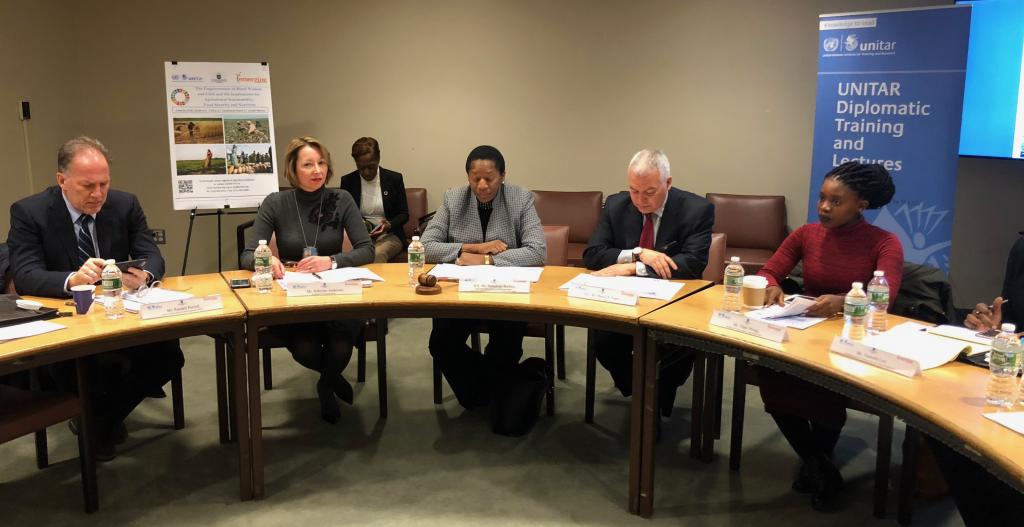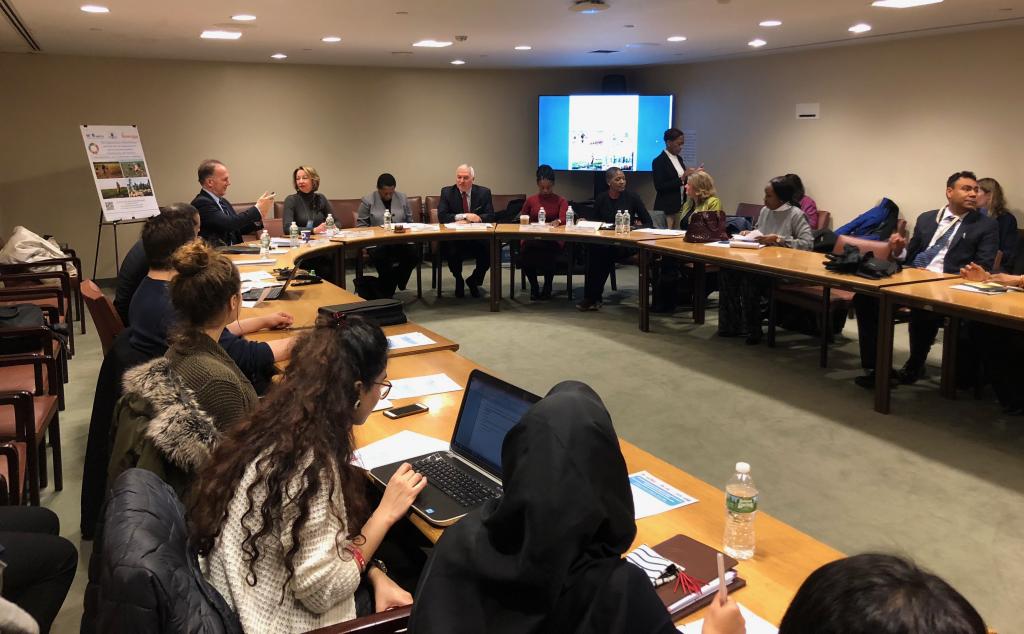UNITAR and Emerging Ag Inc: The Empowerment of Rural Women
 02 March 2018, New York, United States - United Nations Institute for Training and Research (UNITAR) has successfully delivered and co-hosted a training session with the Emerging Ag Inc. Emerging Ag Inc. is a boutique international consulting firm providing communications and public affairs services to clients in the Agriculture, Food and Health sectors. The course “The Empowerment of Rural Women and Girls and the Implications for Agricultural Sustainability, Food Security and Nutrition” was consisted of two sessions with different focuses. Both sessions were moderated by Ms. Robynne Anderson, the president of the Emerging Ag Inc. The course was one of the “kick-off events” for the 62nd Commission on the Status of Women Week, which will begin next week from 12 to 23 March 2018. The event lasted from 10:00am to 1:00pm on 6 March in the United Nations Headquarters in New York.
02 March 2018, New York, United States - United Nations Institute for Training and Research (UNITAR) has successfully delivered and co-hosted a training session with the Emerging Ag Inc. Emerging Ag Inc. is a boutique international consulting firm providing communications and public affairs services to clients in the Agriculture, Food and Health sectors. The course “The Empowerment of Rural Women and Girls and the Implications for Agricultural Sustainability, Food Security and Nutrition” was consisted of two sessions with different focuses. Both sessions were moderated by Ms. Robynne Anderson, the president of the Emerging Ag Inc. The course was one of the “kick-off events” for the 62nd Commission on the Status of Women Week, which will begin next week from 12 to 23 March 2018. The event lasted from 10:00am to 1:00pm on 6 March in the United Nations Headquarters in New York.
The morning session started with two keynote speeches delivered respectively by H.E. Ms. Pennelope Beckles, the Ambassador Extraordinary and Plenipotentiary of the Republic of Trinidad and Tobago, and Mr. Marco A. Suazo, the Head of UNITAR New York Office. In the keynote speech, H.E. Ms. Pennelope Beckles emphasized the crucial contributions rural women have made to the agriculture income and agriculture production. With a mention of her personal experience growing up in a rural area in Trinidad and Tobago with no pipe run water, she especially sympathized with the rural women who are lack of access to basic necessities: economic resources, quality education, clean water, sanitation…etc. H.E. Ms. Pennelope Beckles believes the enforcement from the government is the key for the improvement of rural women’s statuses. She mentioned the government of the Republic of Trinidad and Tobago has made its efforts to provide community fund with special interest rate for the women who are in need of supports. Mr. Suazo further asserted the determination on the gender equality promotion and zero tolerance on sexual assaults. He believes this event has raised awareness of a significant, yet often overlooked, group of females in the world – which made the course especially unique and meaningful.
Session I: “Agriculture and the Sustainable Development Goals (SDGs)” began with a brief introduction delivered by Ms. Robynne Anderson. Empowering the status of rural women is crucial for the achievement of the SDG 2: “Zero Hunger” and SDG 5: “Gender Equality”. Yet, as Ms. Robynne Anderson has mentioned, several factors are challenging the achievements of SDG2 and SDG5 today which include: food waste, which have led to 40% loss of farmers’ crops and the absence of access to the market. Three panelists traveled from different parts of the world with distinct, yet inter-connected backgrounds have joined and shared their personal experience during the first session. Ms. Thato Moagi, the managing director of the Legae La Banareng Farms is a young female farmer travelled from South Africa. In her opinions, the situation is extremely difficult for rural women today because not only did they have to finish the essential and basic farm works, they also need to consider making profit to support themselves and their families. Therefore, providing a competitive, accessible market for rural women could directly lead to the increase of rural women’s financial status. Mr. Randall Purcell, senior advisor from the World Food Program (WFP), with years of working experience in the World Bank, he put the attention on the increase in the world hunger index. He believed the youth issue stood in the center of the concern since less and less youths are willing to repeat their parents’ professionals: farming. Ms. Tamisha Lee, a registered farmer from Jamaica and the president of Jamaica Network of Rural Women Producers have mentioned the importance of women being in the center of the agriculture issues- as women are facing a lot of challenges that men don’t. Going along with the talks given by the panelists, the session has also covered several other relevant issues such as: giving farmers choices and rights to choose- helping farmers gain initiatives, agriculture tourism, creating value addition in order to increase the farms’ income, increasing farmers’ capacities on rick management and risk analysis…etc.
 Session II: “Women’s Participation in and Contributions to Agriculture” was joined by three other panelists included: Mr. Zak Bleicher, Head-of-Office and partnership officer from the International Fund for Agricultural Development (IFAD); Ms. Carla Mucavi, the director from the Liaison Office of the Food and Agriculture Organization (FAO) of the UN, New York and last but not least, Ms. Nicoline de Haan, the Gender Team leader from the International Livestock Research Institute (ILRI). Mr. Zak Bleicher explained in detail on the challenges and difficult choices that rural women have to face today such as “money or business”, the patriarchic environment in the rural area, challenge to gain the leadership positions. Ms. Carla Mucavi noted that the nutrition issue is as important as the hunger issue – lack of nutrition has led to the increase of death. Ms. Nicoline de Haan has given an extremely passionate talk on the relations between rural women and their livestock– and how livestock have the possibility to increase the financial situation of women but on the other hand, also consume most of the energy from rural women. A few points raised by her have received huge applause from the audience such as: instead of making women do everything, the real essence of the gender equality is about the collaboration between rural males and female; the patriarchic culture is able to and should be changed throughout the time; rural women are bearing more pressures and for most of the time, doing more jobs in the household. Therefore, what they need is a fair distribution on labor and respects.
Session II: “Women’s Participation in and Contributions to Agriculture” was joined by three other panelists included: Mr. Zak Bleicher, Head-of-Office and partnership officer from the International Fund for Agricultural Development (IFAD); Ms. Carla Mucavi, the director from the Liaison Office of the Food and Agriculture Organization (FAO) of the UN, New York and last but not least, Ms. Nicoline de Haan, the Gender Team leader from the International Livestock Research Institute (ILRI). Mr. Zak Bleicher explained in detail on the challenges and difficult choices that rural women have to face today such as “money or business”, the patriarchic environment in the rural area, challenge to gain the leadership positions. Ms. Carla Mucavi noted that the nutrition issue is as important as the hunger issue – lack of nutrition has led to the increase of death. Ms. Nicoline de Haan has given an extremely passionate talk on the relations between rural women and their livestock– and how livestock have the possibility to increase the financial situation of women but on the other hand, also consume most of the energy from rural women. A few points raised by her have received huge applause from the audience such as: instead of making women do everything, the real essence of the gender equality is about the collaboration between rural males and female; the patriarchic culture is able to and should be changed throughout the time; rural women are bearing more pressures and for most of the time, doing more jobs in the household. Therefore, what they need is a fair distribution on labor and respects.
The course was well-received by the audience. A wide range of audience have participated in the training session and have proposed a lot of valuable points. From the delegates from different committees, staffs from different missions to NGO representatives, the session has fulfilled its objectives as to increase the awareness on the fields below: safeguard natural resources, share knowledge, build local access and capacity, protect harvests, enable access to markets, priorities research imperatives. UNITAR had a pleasant experience working with Emerging Ag and believes this event will be a remarkable step on fulfilling the SDGs.
Photos: Panelists and participants of the workshop

